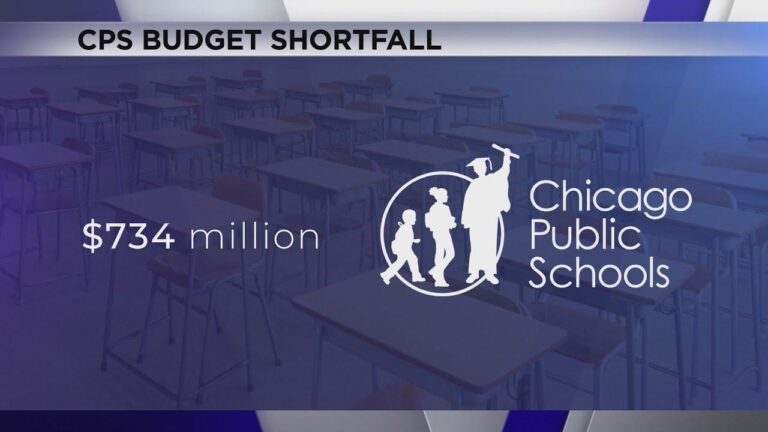Chicago Public Schools Confronts $734 Million Budget Crisis as Academic Year Commences
Severe Financial Deficit Threatens Chicago’s Largest School District
As thousands of students return to classrooms throughout Chicago,the Chicago Public Schools (CPS) system is grappling with an alarming budget deficit of approximately $734 million. This significant financial gap jeopardizes essential educational programs, staffing levels, and critical resources just as the new school year begins. District leaders caution that without swift and effective fiscal measures, the quality of education could suffer, potentially leading to arduous decisions such as program reductions or even school closures.
The primary contributors to this fiscal shortfall include:
- Decreased funding from state and local government sources
- Escalating operational expenses driven by inflationary pressures
- Ongoing costs associated with COVID-19 health and safety protocols
- Underestimated pension liabilities impacting long-term budgets
Community advocates and labor unions have urged transparent dialogue and cooperative problem-solving to protect student opportunities, emphasizing that the city’s future prosperity depends heavily on the strength and stability of its public education system.
| Category | Budget Deficit Impact | Likely Consequences |
|---|---|---|
| Personnel | -$200M | Potential layoffs and hiring freezes |
| Programs & Services | -$150M | Cutbacks in extracurricular and support services |
| Facilities | -$100M | Deferred maintenance and possible school closures |
| Technology | -$50M | Limited upgrades and outdated equipment |
| Health & Safety | -$30M | Reduced COVID-19 related resources |
Consequences of the Budget Deficit on Educational Materials and Student Support
The $734 million funding gap is severely impacting classroom supplies and student support services across CPS. Teachers report heightened challenges as access to basic materials such as textbooks, digital devices, and instructional tools becomes increasingly scarce. Many educators are forced to ration supplies or share outdated resources among multiple classrooms, which risks diminishing student engagement and learning outcomes from the outset of the school year.
Beyond instructional materials, vital student services are also facing significant cutbacks. Programs that provide mental health counseling, after-school tutoring, and special education support are especially vulnerable. The reduction or elimination of these services could disproportionately affect students with special needs or those experiencing emotional and academic difficulties, exacerbating existing inequities.
| Resource | Expected Reduction | Potential Impact |
|---|---|---|
| Textbooks & Classroom Supplies | 50% Decrease | Lower student engagement and participation |
| Access to Technology | Fewer Devices Available | Hindered digital learning opportunities |
| Mental Health Services | 30% Staff Reduction | Increased student stress and unmet needs |
| Special Education Programs | Program Cuts | Reduced individualized support |
| After-School Activities | Funding Eliminated | Fewer enrichment and developmental opportunities |
Community and Union Mobilization in Response to CPS Funding Crisis
In response to the critical $734 million deficit, local unions and community groups have intensified their advocacy efforts to secure additional funding for Chicago Public Schools. The Chicago Teachers Union (CTU) has voiced strong opposition to cuts that threaten both educator employment and student programs, demanding protective measures to maintain educational standards and job security.
Grassroots coalitions have launched campaigns aimed at raising public awareness and pressuring policymakers at the city and state levels to prioritize equitable school funding. Their initiatives include:
- Organizing community rallies and town hall meetings to unite parents,teachers,and civic leaders
- Circulating petitions advocating for fair and sustained investment in public education
- Partnering with advocacy organizations to amplify student and family voices in budget negotiations
| Group | Primary Focus | Planned Actions |
|---|---|---|
| Chicago Teachers Union (CTU) | Safeguarding educator jobs and student programs | Engaging in negotiations with CPS administration |
| Parents and Community Advocates | Campaigning for equitable funding distribution | Hosting public demonstrations and advocacy efforts |
| Local Advocacy Organizations | Elevating student and family perspectives | Lobbying legislators and conducting media outreach |
Proposed Approaches to Mitigate CPS’s Budget Deficit
In light of the $734 million deficit, CPS leadership has introduced a thorough strategy aimed at closing the financial gap while striving to preserve educational quality. Key initiatives include renegotiating contracts with suppliers to achieve cost savings, implementing strategic staffing adjustments that prioritize classroom teachers, and aggressively pursuing federal and state grants targeted at under-resourced districts. Moreover, CPS is exploring partnerships with local businesses to foster community investment and support enrichment programs, thereby alleviating some financial pressures.
Additional cost-containment measures focus on enhancing operational efficiency, such as:
- Energy Efficiency Upgrades: Installing modern, energy-saving technologies in school buildings to reduce utility costs.
- Administrative Resource Sharing: Consolidating back-office functions across schools to lower overhead expenses.
- Technology Integration: Utilizing advanced software solutions to streamline procurement and budget management.
| Initiative | Estimated Savings | Expected Timeline |
|---|---|---|
| Supplier Contract Renegotiations | $120 million annually | 6 to 12 months |
| Staffing Adjustments with Priority on Educators | $200 million ongoing | Immediate |
| Energy Conservation Projects | $75 million over three years | 1 to 3 years |
Looking Ahead: Navigating Financial Challenges in Chicago Public Schools
As the new academic year unfolds, the daunting $734 million budget deficit looms large over Chicago Public Schools, casting uncertainty on the district’s ability to provide a seamless educational experience. CPS administrators are under increasing pressure to devise and implement solutions that address funding shortages without sacrificing the quality of instruction or support services. The coming months will be pivotal in determining how effectively CPS can manage this fiscal crisis and what repercussions it will have on students, educators, and families throughout the city.





